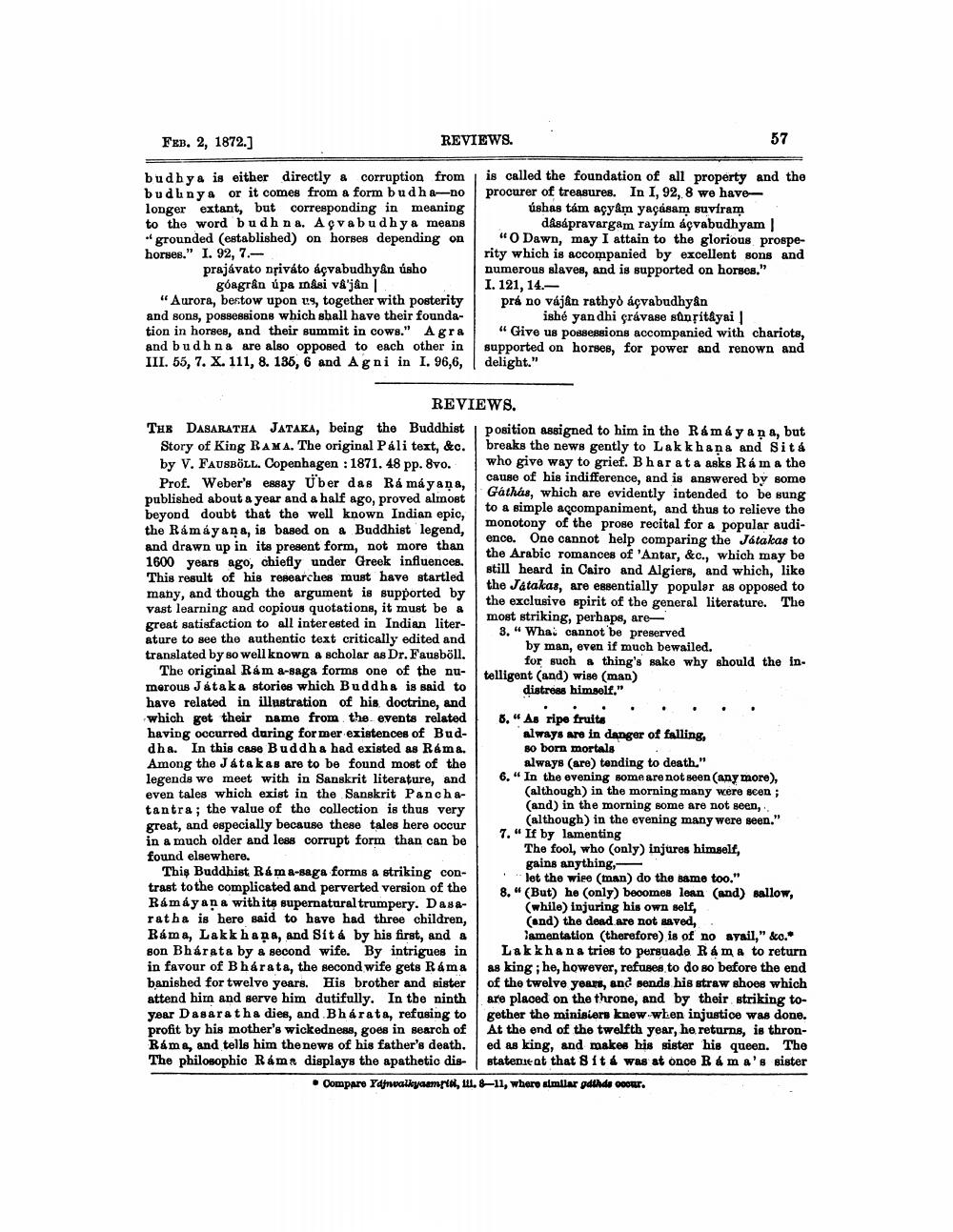________________
FEB. 2, 1872.]
REVIEWS.
57
budbya is either directly a corruption from budunya or it comes from a form budha-no longer extant, but corresponding in meaning to the word budhna. Aç vabu dhy a means • grounded (established) on horses depending on horses." I. 92, 7.
prajávato nșiváto áçvabudhyan úsho
góagrân úpa mási v&'ján "Aurora, bertow upon us, together with posterity and sons, possessions which shall have their foundation in horses, and their summit in cows." Agra and budh na are also opposed to each other in III. 55, 7. X. 111, 8. 135, 6 and Agni in I. 96,6,
is called the foundation of all property and the procurer of treasures. In I. 92.8 we have
ushng tám 8gyÂm yaçasam suviram
dasápravargam rayim áçvabudhyam "O Dawn, may I attain to the glorious prosperity which is accompanied by excellent sons and numerous slaves, and is supported on horses." I. 121, 14.prá no vájän rathyd áçvabudhyân
ishe yan dhi çrávase sunțitayai “Give us possessions accompanied with chariots, supported on horses, for power and renown and delight."
REVIEWS. THE DASARATHA JATAKA, being the Buddhist position assigned to him in the Rámáyaņa, but
Story of King RAMA. The original Páli text, &c. breaks the news gently to Lakk hana and Sita by V. FAUSBÖLL. Copenhagen : 1871. 48 pp. 8vo.
who give way to grief. Bharata asks Rám a the Prof. Weber's essay Uber das Rá máyana,
cause of his indifference, and is answered by some
Gáthás, which are evidently intended to be sung published about a year and a half ago, proved almost
to a simple accompaniment, and thus to relieve the beyond doubt that the well known Indian epic,
monotony of the prose recital for a popular audithe Rámáyana, is based on a Buddhist legend,
ence. One cannot help comparing the Játakas to and drawn up in its present form, not more than
the Arabic romances of 'Antar, &c., which may be 1600 years ago, chiefly under Greek influences.
still heard in Cairo and Algiers, and which, like This result of his researches must have startled many, and though the argument is supported by
the Jatakas, are essentially populer as opposed to
the exclusive spirit of the general literature. The vast learning and copious quotations, it must be a great satisfaction to all interested in Indian liter
most striking, perhaps, are
3." Whai cannot be preserved ature to see the authentic text critically edited and
by man, even if much bewailed. translated by so well known a scholar as Dr. Fausböll.
for such a thing's sake why should the inThe original Rám a-saga forms one of the nu- telligent (and) wise (man) merous Játaka stories which Buddha is said to
distress himself." have related in illustration of his doctrine, and which get their name from the events related 8." As ripe fruits having occurred during for mer existences of Bud- always are in danger of falling, dha. In this case Buddha had existed as Ráma.
Bo born mortals Among the Játakas are to be found most of the always (are) tending to death." legends we meet with in Sanskrit literature, and 6." In the evening some are not seen (any more), even tales which exist in the Sanskrit Pancha
(although) in the morning many were scen; tantra, the value of the collection is thus very
(and) in the morning some are not seen, great, and especially because these tales here occur
(although) in the evening many were seen." in a much older and less corrupt form than can be
7." If by lamenting
The fool, who (only) injures himself, found elsewhere.
gains anything, This Buddhist Rám a-saga forms a striking con
let the wire (man) do the same too." trast to the complicated and perverted version of the
8." (But) he (only) becomes lean (and) sallow, Rámáyana with its supernatural trumpery. Dasa
(while) injuring his own self, ratha is here said to have had three children, (and) the dead are not saved, . Ráma, Lakkhana, and Sit á by his first, and a Jamentation (therefore) is of no avail," &c.* Bon Bhárata by & second wife. By intrigues in Lakkhana tries to persuade Rama to return in favour of Bharata, the second wife gets Rama as king; he, however, refuses to do so before the end banished for twelve years. His brother and sister of the twelve years, and sends his straw shoes which attend him and serve him dutifully. In the ninthare placed on the throne, and by their striking toyear Dasara tha dies, and Bharata, refusing together the minisiers knew.wlen injustice was done. profit by his mother's wickedness, goes in search of At the end of the twelfth year, he returns, is thronRáme, and tells him the news of his father's death, ed as king, and makes his sister his queen. The The philosophic Ráme displays the apathetic dis- statense at that 8ítá was at once Ráma's sister
• Compare Yamalkaampla, u. 8-11, where similar odide coour.




